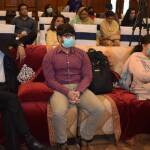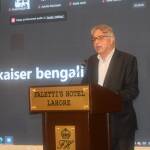LAHORE, Pakistan: The government needs to prioritize broad reforms in order to realize constitutional promise based on the right to free and compulsory education for all children, these views were expressed by experts and educationists at the ILM Conference held in tribute to Mr. I A Rehman (1930-2021) organized under the aegis of the Centre for Social Justice.
The discussion focused on the way forward on the implementation of Article 25A of the constitution of Pakistan, Academic Freedom and Single National Curriculum.
The ILM Conference was attended by senior human rights activists, intellectuals, educationists, students in person, and hundreds of participants online.
In the opening remarks, Peter Jacob, the Executive Director CSJ, stated that Article 25A of the Constitution of Pakistan establishes free and compulsory education as a fundamental human right. Since it’s passing under the 18th Amendment several steps have been taken by the federal and provincial governments.
However, issues of out-of-school children, low enrollment, dropouts, lack of teachers’ training, limited budget allocations, violation of article 22(1), and absence of wide and inclusive consultations remain the core concerns.
Dr. Kaiser Bengali, an economist, researcher and policy expert, in his presentation on “Education in Pakistan: Context and Commitment” addressed two issues. First, in the context of the relationship of education with key human development indicators: literacy, enrolment, immunization, reproductive health, etc. and the relationship of education to the unequal economic power structure, represented by unequal land ownership, and attributes the poor outcomes a lack of commitment to promoting equality. Two, how it reflects on the pretentious language of the numerous education plans and programs. Lamenting the failure of the previous plan or programme. Dr. Bengali, stressed the need to move away from asking the same power elites for better outcomes and struggle for an egalitarian power structure.
While discussing the policy direction in light of Article 25A, Educationist and Policy expert Dr. Baela Raza Jamil elaborated that the National Education Policy 2021 is an opportunity to frame education challenges through a dynamic lens and the constitutional provision is given in Article 25A.
“It is vital to recognize that 25 A laws across Pakistan must be implemented progressively-they have been lying in the cold storage since 2010/12/14/17 (across ICT/Sindh/Balochistan/Punjab and KP). Education is a multi-sectoral activity that in its essence and purpose grants right to education to all without any discrimination. The policy in making must address out-of-school children with a priority focus on the education of girls, children with disabilities, minorities, and the poorest by providing them facilities near their homes with quality content, pedagogies that combine academic and life skills with well-prepared and trained teachers. It must be backed by resources to ensure supply-side, adequacy of facilities, and procurement of service delivery to reach the most vulnerable” she added.
Dr. A H Nayyar, renowned educationist and researcher, evaluated the state of academic freedom in educational institutions of Pakistan. He pointed out that true academic work is unthinkable without the freedom to think and to express.
“The powers that put curbs on academic freedom are, in general, deeply insecure from within, and fear challenges from honest academic work. Therefore, steps would be required on part of the government to ensure that obstacles to freedom of conscience thought, and expression is removed” he added.
Dr. Ayesha Razzaque, an educationist and researcher, presented findings of her recent assessment of “The constitutionality of textbooks under Single National Curriculum”. Textbooks for the compulsory subjects of Urdu, English, General Knowledge, Social Studies, Science, and Math, for grade 1 to 5, published by Punjab Curriculum & Textbook Board were analyzed. It assessed the constitutionality with regard to 22(1) with regard to the Constitution of Pakistan.
The analysis showed that the textbooks explicitly as well as implicitly infringe on the rights of children and teachers from faiths other than Islam as guaranteed by the constitution and the use of the textbooks in their current form will only perpetuate religious intolerance in the society damaging the well-being of children from both the majority and the minority faiths.
Dr. Tania Saeed, Associate Professor, shed light on the right to education in relation to problems on the ground exploring questions of who has access to education, the kind of access, and who is left behind while sharing narratives from local communities.
Renowned advocate, Saqib Jillani assessed the legal framework on the Right to Education. He emphasized that Article 25A, is not a stand-alone right, it is part of Fundamental Rights specified in the Constitution.
Therefore, it is vital to understand the importance of the Right to Education by studying the underpinnings that connect this right to many other Fundamental Rights awarded including article 11, 19, 19a and article 22 of the constitution of Pakistan.
Saqib Jillani pointed out the importance and need for the federal and provincial education departments to comply with the rights guaranteed to all in the constitution, underscored several pronouncements of the Supreme Court of Pakistan.
Participants urged the government to consider the following demands/recommendations:
(a) Federal and provincial education ministries must devote adequate resources (8% GDP) and the potential to make education compulsory and available to all.
(b) Encourage the development of secondary education, including general and vocational education, make them available and accessible to every child, and launch incentive measures for the out-of-school children.
(c) Outline specific guidelines in National Education Policy for the provincial education departments and textbook boards about avoiding discrimination on the basis of religion, gender, sect, language, ethnicity, etc. in all learning processes.
(d) The policy should provide a definition for terminology such as discrimination and hate speech, moreover proper guidelines for authors, reviewers and teachers, to tackle the issue of religious and social intolerance.
(e) Ensure academic freedom at all levels in order to promote a culture of a knowledge-based society in Pakistan.
(f) The curriculum and policy in the pipeline should have a genuine plan with well-defined targets on policy action, completion timeline, estimated expenses, annual budgetary needs, and annual audit mechanism.
(g) Education boards should focus on teachers’ training programs incorporating elements of analysis, critical thinking, human rights, social justice and peace-building frameworks to sensitize the students on contextual issues of social cohesion, cultural and religious diversity.
(h) Take measures to encourage regular attendance at schools and the reduction of dropout rates.
A short film based on the life and struggle of Mr. I A Rehman was also screened in the Conference.


